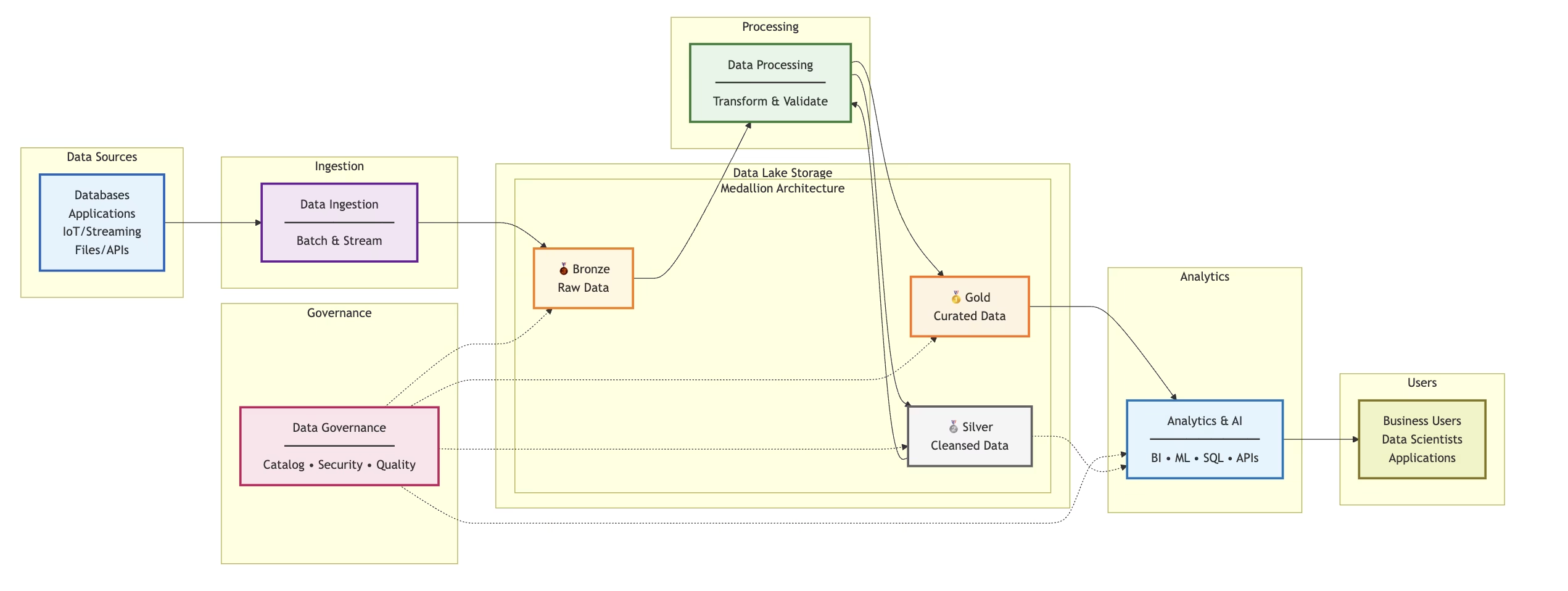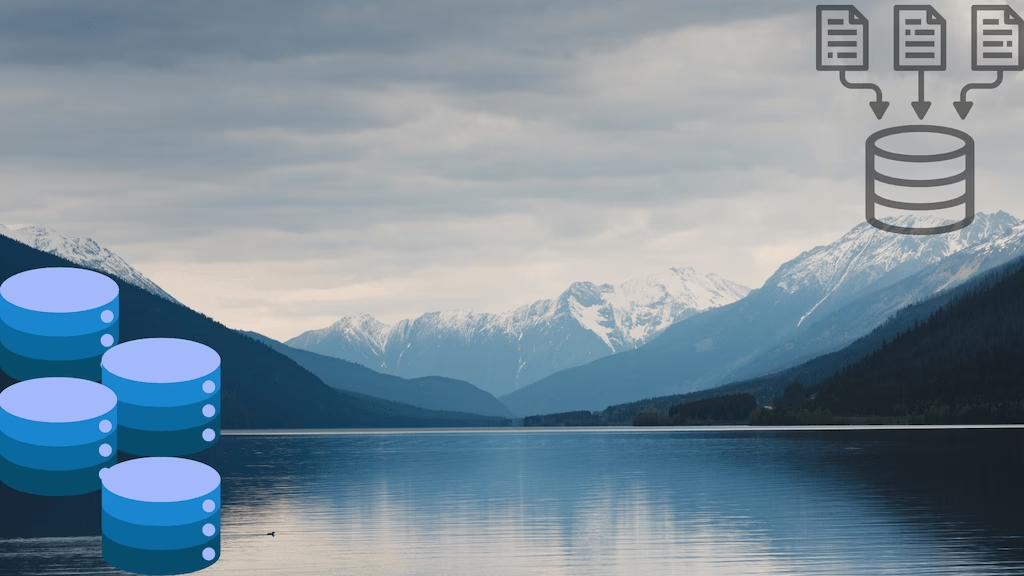Introduction
Understanding the data lakehouse meaning and how it compares to traditional data warehouses and data lakes is essential for enterprises seeking agility, scalability, and cost efficiency in handling diverse data workloads.
- A Data Lakehouse combines the scalable, low-cost storage flexibility of data lakes with the management, data integrity, and querying capabilities of warehouses, providing a unified platform for analytics and AI.
- A Data Warehouse is optimised for structured data storage and high-performance SQL analytics supporting business intelligence.
- A Data Lake stores vast volumes of raw, structured, semi-structured, and unstructured data, ideal for big data processing and machine learning but often lacking governance and optimized querying.
What is a Data Lake?
Definition and Use Cases
A data lake offers flexible, inexpensive storage of raw data in its native format, covering all data types, ideal for machine learning (ML), AI, Geospatial analytics, and exploratory analytics.
Architecture Components
- Utilizes cloud object storage (e.g., AWS S3, Azure Data Lake Storage) allowing for elastic storage scaling.
- Supports schema-on-read, where data structuring happens at query time.
- Data ingestion supports batch and streaming sources.

Advantages
- Handles structured, semi-structured, and unstructured data efficiently.
- Highly scalable and cost-effective.
- Supports data science workflows with versatile programming language support (Python, R, Scala).
Limitations
- No native ACID transactional guarantees complicate concurrent updates.
- Lack of enforced schema can lead to data quality issues (“”data swamp””).
- Poor performance for BI-oriented, relational queries.
What is a Data Warehouse?
Definition and Use Cases
A data warehouse acts as a centralized repository for structured data aggregated from various operational systems, designed to support business intelligence (BI), reporting, and descriptive analytics. Data is ingested via ETL (Extract, Transform, Load) processes ensuring schema-on-write consistency.
Architecture Overview
- Centralized relational database with organized tabular and star schema structures.
- Integrated data integration tools for ETL/ELT workflows.
- Robust metadata management enabling data governance.
- OLAP engines and BI tools for interactive reporting and dashboarding.
Advantages
- High data reliability with ACID transactional compliance.
- Tailored for complex, high-speed SQL queries.
- Proven for historical trend analysis and decision support.
Limitations
- Scalability challenges with growing data velocity and volume.
- Expensive storage and compute costs.
- Limited flexibility for unstructured or semi-structured data.
What is a Data Lakehouse?
Definition and Architecture Diagram
A data lakehouse merges data lake flexibility with data warehouse management and performance, providing a modern, unified data platform. Key architectural layers include:

- Ingestion layer for batch and streaming data.
- Storage layer using cost-efficient cloud object stores.
- Metadata layer implementing unified catalogs and governance (often via Iceberg, Delta Lake, or Apache Hudi table formats).
- API layer facilitating standardized access.
- Consumption layer supporting BI, ML, and real-time analytics.
Key Benefits
- ACID transaction support delivering reliable concurrent reads and writes.
- Schema enforcement alongside schema evolution enabling structured analysis.
- Significant cost savings via separation of compute and storage.
- Reduced data redundancy eliminating the need for separate lakes and warehouses.
- Improved data governance, lineage, and security.
Examples and Platforms
Leading data lakehouse platforms include Databricks Lakehouse, Snowflake, AWS Lake Formation, and IBM watsonx.data, combining open table formats with cloud scalability.
Data Lakehouse vs Data Warehouse vs Data Lake: At-a-Glance Comparison
| Feature | Data Warehouse | Data Lake | Data Lakehouse |
|---|---|---|---|
| Data Types Supported | Structured only | Structured, semi-structured, unstructured | Structured, semi-structured, unstructured |
| Data Organization | Highly organized (schema-on-write) | Raw data, minimal organization (schema-on-read) | Highly organized with schema enforcement |
| Cost | High | Low | Cost-effective |
| Scalability | Limited by coupled storage & compute | Highly scalable (separate compute and storage) | Highly scalable (separate compute and storage) |
| Query Performance | Optimized for SQL workloads | Slower, needs external tools | Comparable to data warehouses |
| ACID Transactions | Supported | Not supported | Fully supported |
| Use Case Examples | BI reporting, financial analysis | Machine learning, exploratory analytics | Unified analytics & AI workloads |
| Vendor Lock-in | Proprietary formats | Mostly open | Open table formats (Iceberg, Delta) |
| Streaming Data Support | Mostly batch | Supported | Supported |
How Enterprises Are Leveraging Data Lakehouses
- Scalable Data Engineering: Consolidating structured and unstructured data for streamlined pipelines.
- Unified Analytics Platform: Enabling both business analysts and data scientists to work on the same datasets.
- AI and ML Enablement: Cost-effectively storing large training datasets and supporting iterative model development.
- Governance and Compliance: Improved metadata management simplifies GDPR, HIPAA, and CCPA adherence.
Microsoft Fabric Lakehouse vs Warehouse: March 2025 Update Highlights
Microsoft Fabric expands Lakehouse capabilities, addressing previous limitations by introducing:
- Enhanced Row-Level Security (RLS) and Column-Level Security (CLS), achieving parity with Warehouses.
- Integration of unstructured data with tabular formats in Lakehouse architecture.
- Positioning Lakehouse as Fabric’s centralized data platform for hybrid workloads, reducing the need for separate warehouses.
Use Cases for Data Lakes
Data lakes are perfect for scenarios where you need to store large volumes of raw data. For instance, businesses dealing with real-time data streams or training machine learning models benefit greatly from data lakes. They provide the scalability and flexibility needed to handle diverse data types without upfront structuring.
Use Cases for Data Warehouses
Data warehouses shine in environments where structured data is key. They are ideal for business reporting, analytics, and historical data analysis. Companies that need to consolidate data from multiple sources and perform complex queries quickly and efficiently rely on data warehouses.
Use Cases for Data Lakehouses
Data lakehouses offer a unified approach to data management. They are great for real-time analytics and reporting, simplifying data architecture by combining the strengths of data lakes and data warehouses. This makes them suitable for businesses looking to integrate diverse data types and streamline data processing.
Conclusion: Choosing the Right Data Architecture in 2025
The decision between a data warehouse, data lake, or data lakehouse hinges on your organisation’s:
- Data types and volumes
- Use case complexity (business intelligence vs. AI/ML)
- Cost considerations and scalability needs
- Governance and real-time data requirements
Data lakehouses represent the future of unified data platforms, combining the best of lakes and warehouses—delivering flexibility, performance, and cost-efficiency for modern enterprises.
FAQ
A data lakehouse unifies the flexibility of a data lake and the management, schema, and query optimization of a data warehouse, supporting both structured and unstructured data with reliable transactions.
Generally yes. Data lakehouses leverage inexpensive cloud object storage and separate compute scaling, reducing storage and infrastructure costs compared to traditional warehouses.
Yes, data lakehouses support both batch and real-time streaming data, enabling up-to-date analytics and reporting.
Databricks Lakehouse, Snowflake, AWS Lake Formation, and IBM watsonx.data are prominent data lakehouse platforms.
By providing unified access to vast amounts of raw and processed data with strong governance and versioning, lakehouses accelerate ML model training and deployment.
Additional Resources
For more detailed and vendor specific technical information, check out the following resources:
Reference:


2 thoughts on “Data Lake vs Lakehouse: Which One Should You Use in 2025?”